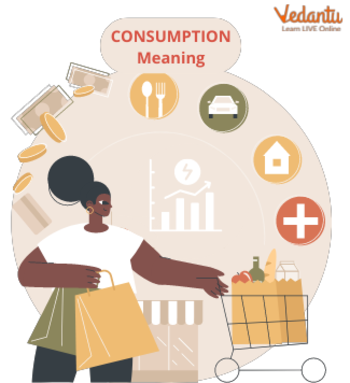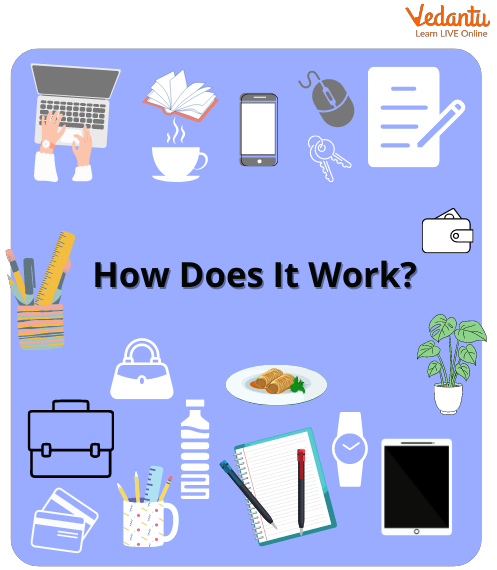




What is Consumption?

What Does the Definition of the Word "Consumption" Mean?
In Accountancy, consumption meaning is how households use goods and services. Spending on goods and services for personal use is known as "consumption expenditure," which is different from "consumption." For example, durable products, such as vehicles, produce an expenditure mainly when acquired but also provide "consumption services" (for instance, an automobile offers transportation services) until they are replaced or destroyed, which is where the two concepts diverge.
According to neoclassical (mainstream) economists, consumption is the ultimate goal of economic activity, making per capita consumption a vital indicator of an economy's prosperity. Both macroeconomics and microeconomics depend heavily on research into consumer habits. There are two main reasons why macroeconomists look at total consumer spending.
The Consumption Function

Determinants of Consumption Function
What is consumption function? The consumption rate is of great interest to contemporary economists since it indicates the kind of economic system that dominates in a given nation.
The First Step Towards Any Economic Growth
Spending on goods and services is the first step in the economic cycle. Every human being has the innate drive to get what he wants. Consumption, or the gratification of human desires, is the end outcome of such an endeavour.
Putting An End To All Economic Activity
For instance, a person will go into the trouble of making a sandwich if they want one. When food is produced, economic activity continues until it is eaten.
Productivity is Pushed Forward By Consumer Spending
"Consumption is the primary objective of all production." What this implies is that there is a direct correlation between consumer spending and the economy.
Theory in Economics
Economists have significantly benefited from research into consumer behaviour, leading to ideas like the Law of Demand, the concepts of Consumer Surplus, and the Law of Declining Marginal Utility. With these ideas, economists may better comprehend private actions' role in shaping national GDP.
Conceptions of Government
The government may also use consumption patterns to develop hypotheses. For example, the tax rate and the minimum wage are set according to people's typical spending patterns. It's also helpful in guiding policy choices on the nation's production of necessities and luxury items. The ratio of people's savings to their discretionary income may also be gauged using this metric, which is helpful for policy making.
Analysis of Wages and Employment
Economics heavily emphasises consumer spending to generate economic growth and job creation. According to Keynesian theory, output decreases when consumer spending does not raise demand for products and services. Moreover, since fewer goods would be manufactured, many companies may have to lay off staff. Thus, consumption contributes to the economy's total revenue and production.
Cyclical Nature of Consumption and Its Relationship with the Economy

Consumption and the Business Cycle
Two-thirds of GDP is private Consumption (GDP). One-third is government spending and net exports. Personal consumption is classified into three categories: durable items, services such as travel and automobile maintenance, and non-durable commodities such as food and water. Consumption expenditures assist analysts in comprehending business cycle changes. Durable goods producers gain money from the first sale (expense), not through consumption.
Expenditures, not consumption, determine short-term economic success. Durable products need a logical optimisation framework, so economists devised one. Durable items demand a significant investment, so customers delay purchasing until the economy improves. Durable goods consumption is more volatile as the economy improves. Durables expenditure is most affected by interest rates, taxes, and other stimulus measures.
Conclusion
The income-consumption link is the consumption function or the inclination to consume. It may be described as a "functional connection between two aggregates, namely, total consumption and gross national income." All other potential impacts on consumption are ignored to focus only on the income-consumption link, following the ceteris paribus (all things being equal) assumption. The propensity to spend, also known as the consumption function, is a table that lists the various quantities of consumer expenditure at different income levels.
FAQs on Concept and Calculation of Consumption in Economics
1. What is the basic concept of consumption in economics?
In economics, consumption refers to the total spending by households on goods and services to satisfy their wants. It is a major component of Aggregate Demand and is primarily determined by the level of disposable income.
2. What is the consumption function and what does it represent?
The consumption function is an economic formula showing the relationship between total consumption spending and total income. It is expressed as C = a + bY, where 'C' is total consumption, 'a' is autonomous consumption, 'b' is the marginal propensity to consume (MPC), and 'Y' is income. It helps us understand how spending patterns change as income levels change.
3. What is the main difference between autonomous and induced consumption?
The key difference is their relationship with income.
- Autonomous consumption (a) is the minimum level of spending that occurs even when income is zero. It is independent of income and represents spending on necessities, often paid for from savings.
- Induced consumption (bY) is the part of spending that changes directly with income. As income rises, induced consumption also rises.
4. How do you calculate an individual's total consumption using the formula?
To calculate total consumption, you use the formula C = a + bY. First, identify the value of autonomous consumption ('a'), which is spending at zero income. Then, find the Marginal Propensity to Consume ('b') and multiply it by the current level of income ('Y'). Adding autonomous consumption to this result gives you the total consumption spending.
5. Why does the consumption curve on a graph start from the Y-axis and not the origin?
The consumption curve starts from a positive point on the Y-axis (representing consumption) because of autonomous consumption. This shows that even if income (on the X-axis) is zero, there is still a minimum level of consumption required for survival. This basic spending is financed through savings or borrowing, not from current income.
6. What does the slope of the consumption curve tell us?
The slope of the consumption curve represents the Marginal Propensity to Consume (MPC). The MPC indicates the proportion of each extra rupee of income that will be spent on consumption. A steeper slope means a higher MPC, suggesting people tend to spend a larger part of their additional income.
7. Is it possible for the Marginal Propensity to Consume (MPC) to be greater than 1?
No, the value of the Marginal Propensity to Consume (MPC) cannot be greater than one. The MPC measures how much of an additional unit of income is spent. Since a person cannot spend more than the extra income they receive, the MPC must logically be between 0 and 1. Any portion of the extra income not consumed is saved.
8. How are the Marginal Propensity to Consume (MPC) and Marginal Propensity to Save (MPS) related?
The MPC and the Marginal Propensity to Save (MPS) are complementary and must always add up to one (i.e., MPC + MPS = 1). This is because any additional income earned can only be used in two ways: it can either be spent (consumption) or not spent (saved). Therefore, the fraction of extra income that is consumed (MPC) plus the fraction that is saved (MPS) will always equal the total extra income.























